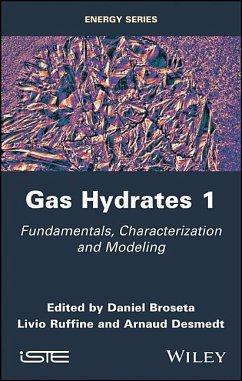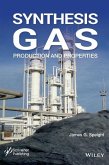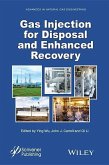Gas Hydrates 1
Fundamentals, Characterization and Modeling
Herausgeber: Broseta, Daniel; Desmedt, Arnaud; Ruffine, Livio
Gas Hydrates 1
Fundamentals, Characterization and Modeling
Herausgeber: Broseta, Daniel; Desmedt, Arnaud; Ruffine, Livio
- Gebundenes Buch
- Merkliste
- Auf die Merkliste
- Bewerten Bewerten
- Teilen
- Produkt teilen
- Produkterinnerung
- Produkterinnerung
Gas hydrates, or clathrate hydrates, are crystalline solids resembling ice, in which small (guest) molecules, typically gases, are trapped inside cavities formed by hydrogen-bonded water (host) molecules. They form and remain stable under low temperatures - often well below ambient conditions - and high pressures ranging from a few bar to hundreds of bar, depending on the guest molecule. Their presence is ubiquitous on Earth, in deep-marine sediments and in permafrost regions, as well as in outer space, on planets or comets. In addition to water, they can be synthesized with organic species as…mehr
Andere Kunden interessierten sich auch für
![Gas Hydrates 2 Gas Hydrates 2]() Gas Hydrates 2193,99 €
Gas Hydrates 2193,99 €![Gas Injection Into Geological Formations and Related Topics Gas Injection Into Geological Formations and Related Topics]() Gas Injection Into Geological Formations and Related Topics277,99 €
Gas Injection Into Geological Formations and Related Topics277,99 €![Synthesis Gas Synthesis Gas]() James G SpeightSynthesis Gas288,99 €
James G SpeightSynthesis Gas288,99 €![Acid Gas Extraction for Disposal and Related Topics Acid Gas Extraction for Disposal and Related Topics]() Acid Gas Extraction for Disposal and Related Topics238,99 €
Acid Gas Extraction for Disposal and Related Topics238,99 €![Gas Injection for Disposal and Enhanced Recovery Gas Injection for Disposal and Enhanced Recovery]() Ying WuGas Injection for Disposal and Enhanced Recovery251,99 €
Ying WuGas Injection for Disposal and Enhanced Recovery251,99 €![Carbon Dioxide Capture and Acid Gas Injection Carbon Dioxide Capture and Acid Gas Injection]() Carbon Dioxide Capture and Acid Gas Injection274,99 €
Carbon Dioxide Capture and Acid Gas Injection274,99 €![Oilfield Chemistry and Its Environmental Impact Oilfield Chemistry and Its Environmental Impact]() Henry A CraddockOilfield Chemistry and Its Environmental Impact189,99 €
Henry A CraddockOilfield Chemistry and Its Environmental Impact189,99 €-
-
-
Gas hydrates, or clathrate hydrates, are crystalline solids resembling ice, in which small (guest) molecules, typically gases, are trapped inside cavities formed by hydrogen-bonded water (host) molecules. They form and remain stable under low temperatures - often well below ambient conditions - and high pressures ranging from a few bar to hundreds of bar, depending on the guest molecule. Their presence is ubiquitous on Earth, in deep-marine sediments and in permafrost regions, as well as in outer space, on planets or comets. In addition to water, they can be synthesized with organic species as host molecules, resulting in milder stability conditions: these are referred to as semi-clathrate hydrates. Clathrate and semi-clathrate hydrates are being considered for applications as diverse as gas storage and separation, cold storage and transport and water treatment. This book is the first of two edited volumes, with chapters on the experimental and modeling tools used for characterizing and predicting the unique molecular, thermodynamic and kinetic properties of gas hydrates (Volume 1) and on gas hydrates in their natural environment and for potential industrial applications (Volume 2).
Hinweis: Dieser Artikel kann nur an eine deutsche Lieferadresse ausgeliefert werden.
Hinweis: Dieser Artikel kann nur an eine deutsche Lieferadresse ausgeliefert werden.
Produktdetails
- Produktdetails
- Verlag: Wiley
- Seitenzahl: 304
- Erscheinungstermin: 7. August 2017
- Englisch
- Abmessung: 241mm x 161mm x 22mm
- Gewicht: 593g
- ISBN-13: 9781848219694
- ISBN-10: 1848219695
- Artikelnr.: 44271917
- Herstellerkennzeichnung
- Libri GmbH
- Europaallee 1
- 36244 Bad Hersfeld
- gpsr@libri.de
- Verlag: Wiley
- Seitenzahl: 304
- Erscheinungstermin: 7. August 2017
- Englisch
- Abmessung: 241mm x 161mm x 22mm
- Gewicht: 593g
- ISBN-13: 9781848219694
- ISBN-10: 1848219695
- Artikelnr.: 44271917
- Herstellerkennzeichnung
- Libri GmbH
- Europaallee 1
- 36244 Bad Hersfeld
- gpsr@libri.de
Daniel Broseta, University of Pau and Pays de l'Adour, France. Livio Ruffine, French Research Institute for the Exploitation of the Sea (Ifremer), France. Arnaud Desmedt, University of Bordeaux, France.
Preface ix
Chapter 1 Neutron Scattering of Clathrate and Semiclathrate Hydrates 1
Arnaud DESMEDT, Laura BEDOURET, Jacques OLLIVIER and Claire PETUYA
1.1 Introduction 1
1.2 Neutron scattering 2
1.2.1 A basic ideal scattering experiment 3
1.2.2 Neutron scattering theory 4
1.2.3 Correlation functions 6
1.2.4 Coherent and incoherent scattering 7
1.2.5 A simple example of scattering 11
1.3 Probing structural and dynamical properties of gas hydrates 14
1.3.1 Structures 15
1.3.2 Relaxation of guest molecules and water molecules 16
1.3.3 Excitations and vibrational density of states 19
1.4 Selected examples 22
1.4.1 Inhibition and formation mechanisms 22
1.4.2 Guest replacement in gas hydrates 29
1.4.3 Hydrogen: from its dynamics properties to its storage capabilities 33
1.4.4 Ionic clathrate hydrates and semiclathrates 41
1.5 Concluding remarks 47
1.6 Bibliography 49
Chapter 2 Spectroscopy of Gas Hydrates: From Fundamental Aspects to
Chemical Engineering, Geophysical and Astrophysical Applications 63
Bertrand CHAZALLON, Jennifer A. NOBLE and Arnaud DESMEDT
2.1 Introduction 63
2.2 Vibrational spectrum 65
2.2.1 Intramolecular modes 66
2.2.2 Intermolecular modes 68
2.3 Applications to the investigation of formation mechanism 72
2.3.1 Formation mechanism: nucleation and growth 72
2.3.2 The Raman contribution 74
2.3.3 Insights from IR spectroscopy 77
2.3.4 Formation mechanism: chemical engineering applications 81
2.4 NGHs: contribution of spectroscopy 84
2.5 Clathrate hydrates in astrophysical environments 92
2.5.1 IR spectroscopy of astrophysical ices 93
2.5.2 Interstellar ices 94
2.5.3 Solar system ices 96
2.5.4 Insights from laboratory spectroscopy 100
2.6 Concluding remarks 101
2.7 Bibliography 102
Chapter 3 High-Resolution Optical Microscopy of Gas Hydrates 113
Nelly HOBEIKA, Maria Lourdes MARTINEZ DE BAÑOS, Patrick BOURIAT, Daniel
BROSETA and Ross BROWN
3.1 Introduction 113
3.2 Optical methods 114
3.2.1 Beyond bright-field modes in optical microscopy 114
3.2.2 Brewster angle microscopy 123
3.3 Selected examples 126
3.3.1 Hydrate halos growing on glass substrates 128
3.3.2 Hydrate crystallization in a guest-in-water emulsion 131
3.3.3 Adsorption of kinetic hydrate inhibitors 136
3.4 Concluding remarks 141
3.5 Acknowledgments 142
3.6 Bibliography 142
Chapter 4 Calorimetric Characterization of Clathrate and Semiclathrate
Hydrates 145
Didier DALMAZZONE, Luiz Paulo SALES SILVA, Anthony DELAHAYE and Laurence
FOURNAISON
4.1 Introduction 145
4.2 DTA and differential scanning calorimetry 146
4.2.1 Principles of DTA and DSC 146
4.2.2 Examples of pressure-controlled DTA and DSC devices for hydrate
studies 147
4.2.3 Temperature calibration of DSC 152
4.3 Phase equilibrium determination in hydrate systems using
pressure-controlled TDA and DSC 153
4.3.1 Proper exploitation of DSC thermograms 153
4.4 Measuring the heat of dissociation and heat capacity of gas hydrates
158
4.4.1 Quantitative in situ hydrate formation 160
4.4.2 Indirect enthalpy measurement and gas content evaluation 162
4.4.3 Heat capacity measurement 163
4.5 Measuring the kinetics of hydrate formation 166
4.6 Conclusion 168
4.7 Bibliography 169
Chapter 5 Thermodynamic Modeling of Solid-Fluid Equilibria: From Pure Solid
Phases to Gas Semiclathrate Hydrates 177
Patrice PARICAUD
5.1 Introduction 177
5.2 Solid-fluid equilibrium between a fluid mixture and a pure solid phase
179
5.2.1 Solid-liquid equilibrium condition 179
5.2.2 SLE in the presence of electrolyte solutions 185
5.2.3 Solid-fluid equilibrium condition 188
5.3 Solid-liquid equilibrium between a liquid mixture and a solid solution
189
5.4 SLE between a liquid mixture and a solid compound 192
5.4.1 Solid-liquid equilibrium with salt hydrates 192
5.4.2 Solid-liquid equilibrium with semiclathrate hydrates 199
5.5 Thermodynamic model for gas semiclathrate hydrates 202
5.5.1 Paricaud's approach 203
5.5.2 The Eslamimanesh et al model 213
5.6 Conclusion 215
5.7 Bibliography 215
Chapter 6 Volume and Non-Equilibrium Crystallization of Clathrate Hydrates
227
Baptiste BOUILLOT and Jean-Michel HERRI
6.1 Introduction 227
6.2 Driving force and evidence for non-equilibrium gas hydrate
crystallization 229
6.2.1 Driving force 229
6.2.2 Cage occupancy from equilibrium thermodynamics 233
6.3 Non-equilibrium hydrate formation? 235
6.3.1 Evidence from experimental studies 236
6.3.2 Clathrate hydrates in fluid inclusions 238
6.3.3 Evidence from molecular dynamics 239
6.3.4 Experimental and modeling issues 240
6.4 Modeling gas to hydrate transfer: equilibrium thermodynamics versus
kinetics 241
6.5 Non-equilibrium flash calculations 242
6.5.1 Basics of flash calculations 242
6.5.2 Conventional flash approach for clathrate hydrates 243
6.5.3 Conclusions on standard flash approaches 248
6.5.4 Non-stoichiometric flash approaches 249
6.5.5 Discussion 255
6.6 A kinetic Langmuir based modeling approach 258
6.6.1 Introduction to the kinetic approach of mixed hydrates 258
6.6.2 Kinetic approach of enclathration 267
6.7 Conclusion 274
6.8 Nomenclature 274
6.8.1 Letters 274
6.8.2 Greek letters 275
6.8.3 Subscript 276
6.8.4 Superscript 276
6.9 Bibliography 276
List of Authors 283
Index 285
Chapter 1 Neutron Scattering of Clathrate and Semiclathrate Hydrates 1
Arnaud DESMEDT, Laura BEDOURET, Jacques OLLIVIER and Claire PETUYA
1.1 Introduction 1
1.2 Neutron scattering 2
1.2.1 A basic ideal scattering experiment 3
1.2.2 Neutron scattering theory 4
1.2.3 Correlation functions 6
1.2.4 Coherent and incoherent scattering 7
1.2.5 A simple example of scattering 11
1.3 Probing structural and dynamical properties of gas hydrates 14
1.3.1 Structures 15
1.3.2 Relaxation of guest molecules and water molecules 16
1.3.3 Excitations and vibrational density of states 19
1.4 Selected examples 22
1.4.1 Inhibition and formation mechanisms 22
1.4.2 Guest replacement in gas hydrates 29
1.4.3 Hydrogen: from its dynamics properties to its storage capabilities 33
1.4.4 Ionic clathrate hydrates and semiclathrates 41
1.5 Concluding remarks 47
1.6 Bibliography 49
Chapter 2 Spectroscopy of Gas Hydrates: From Fundamental Aspects to
Chemical Engineering, Geophysical and Astrophysical Applications 63
Bertrand CHAZALLON, Jennifer A. NOBLE and Arnaud DESMEDT
2.1 Introduction 63
2.2 Vibrational spectrum 65
2.2.1 Intramolecular modes 66
2.2.2 Intermolecular modes 68
2.3 Applications to the investigation of formation mechanism 72
2.3.1 Formation mechanism: nucleation and growth 72
2.3.2 The Raman contribution 74
2.3.3 Insights from IR spectroscopy 77
2.3.4 Formation mechanism: chemical engineering applications 81
2.4 NGHs: contribution of spectroscopy 84
2.5 Clathrate hydrates in astrophysical environments 92
2.5.1 IR spectroscopy of astrophysical ices 93
2.5.2 Interstellar ices 94
2.5.3 Solar system ices 96
2.5.4 Insights from laboratory spectroscopy 100
2.6 Concluding remarks 101
2.7 Bibliography 102
Chapter 3 High-Resolution Optical Microscopy of Gas Hydrates 113
Nelly HOBEIKA, Maria Lourdes MARTINEZ DE BAÑOS, Patrick BOURIAT, Daniel
BROSETA and Ross BROWN
3.1 Introduction 113
3.2 Optical methods 114
3.2.1 Beyond bright-field modes in optical microscopy 114
3.2.2 Brewster angle microscopy 123
3.3 Selected examples 126
3.3.1 Hydrate halos growing on glass substrates 128
3.3.2 Hydrate crystallization in a guest-in-water emulsion 131
3.3.3 Adsorption of kinetic hydrate inhibitors 136
3.4 Concluding remarks 141
3.5 Acknowledgments 142
3.6 Bibliography 142
Chapter 4 Calorimetric Characterization of Clathrate and Semiclathrate
Hydrates 145
Didier DALMAZZONE, Luiz Paulo SALES SILVA, Anthony DELAHAYE and Laurence
FOURNAISON
4.1 Introduction 145
4.2 DTA and differential scanning calorimetry 146
4.2.1 Principles of DTA and DSC 146
4.2.2 Examples of pressure-controlled DTA and DSC devices for hydrate
studies 147
4.2.3 Temperature calibration of DSC 152
4.3 Phase equilibrium determination in hydrate systems using
pressure-controlled TDA and DSC 153
4.3.1 Proper exploitation of DSC thermograms 153
4.4 Measuring the heat of dissociation and heat capacity of gas hydrates
158
4.4.1 Quantitative in situ hydrate formation 160
4.4.2 Indirect enthalpy measurement and gas content evaluation 162
4.4.3 Heat capacity measurement 163
4.5 Measuring the kinetics of hydrate formation 166
4.6 Conclusion 168
4.7 Bibliography 169
Chapter 5 Thermodynamic Modeling of Solid-Fluid Equilibria: From Pure Solid
Phases to Gas Semiclathrate Hydrates 177
Patrice PARICAUD
5.1 Introduction 177
5.2 Solid-fluid equilibrium between a fluid mixture and a pure solid phase
179
5.2.1 Solid-liquid equilibrium condition 179
5.2.2 SLE in the presence of electrolyte solutions 185
5.2.3 Solid-fluid equilibrium condition 188
5.3 Solid-liquid equilibrium between a liquid mixture and a solid solution
189
5.4 SLE between a liquid mixture and a solid compound 192
5.4.1 Solid-liquid equilibrium with salt hydrates 192
5.4.2 Solid-liquid equilibrium with semiclathrate hydrates 199
5.5 Thermodynamic model for gas semiclathrate hydrates 202
5.5.1 Paricaud's approach 203
5.5.2 The Eslamimanesh et al model 213
5.6 Conclusion 215
5.7 Bibliography 215
Chapter 6 Volume and Non-Equilibrium Crystallization of Clathrate Hydrates
227
Baptiste BOUILLOT and Jean-Michel HERRI
6.1 Introduction 227
6.2 Driving force and evidence for non-equilibrium gas hydrate
crystallization 229
6.2.1 Driving force 229
6.2.2 Cage occupancy from equilibrium thermodynamics 233
6.3 Non-equilibrium hydrate formation? 235
6.3.1 Evidence from experimental studies 236
6.3.2 Clathrate hydrates in fluid inclusions 238
6.3.3 Evidence from molecular dynamics 239
6.3.4 Experimental and modeling issues 240
6.4 Modeling gas to hydrate transfer: equilibrium thermodynamics versus
kinetics 241
6.5 Non-equilibrium flash calculations 242
6.5.1 Basics of flash calculations 242
6.5.2 Conventional flash approach for clathrate hydrates 243
6.5.3 Conclusions on standard flash approaches 248
6.5.4 Non-stoichiometric flash approaches 249
6.5.5 Discussion 255
6.6 A kinetic Langmuir based modeling approach 258
6.6.1 Introduction to the kinetic approach of mixed hydrates 258
6.6.2 Kinetic approach of enclathration 267
6.7 Conclusion 274
6.8 Nomenclature 274
6.8.1 Letters 274
6.8.2 Greek letters 275
6.8.3 Subscript 276
6.8.4 Superscript 276
6.9 Bibliography 276
List of Authors 283
Index 285
Preface ix
Chapter 1 Neutron Scattering of Clathrate and Semiclathrate Hydrates 1
Arnaud DESMEDT, Laura BEDOURET, Jacques OLLIVIER and Claire PETUYA
1.1 Introduction 1
1.2 Neutron scattering 2
1.2.1 A basic ideal scattering experiment 3
1.2.2 Neutron scattering theory 4
1.2.3 Correlation functions 6
1.2.4 Coherent and incoherent scattering 7
1.2.5 A simple example of scattering 11
1.3 Probing structural and dynamical properties of gas hydrates 14
1.3.1 Structures 15
1.3.2 Relaxation of guest molecules and water molecules 16
1.3.3 Excitations and vibrational density of states 19
1.4 Selected examples 22
1.4.1 Inhibition and formation mechanisms 22
1.4.2 Guest replacement in gas hydrates 29
1.4.3 Hydrogen: from its dynamics properties to its storage capabilities 33
1.4.4 Ionic clathrate hydrates and semiclathrates 41
1.5 Concluding remarks 47
1.6 Bibliography 49
Chapter 2 Spectroscopy of Gas Hydrates: From Fundamental Aspects to
Chemical Engineering, Geophysical and Astrophysical Applications 63
Bertrand CHAZALLON, Jennifer A. NOBLE and Arnaud DESMEDT
2.1 Introduction 63
2.2 Vibrational spectrum 65
2.2.1 Intramolecular modes 66
2.2.2 Intermolecular modes 68
2.3 Applications to the investigation of formation mechanism 72
2.3.1 Formation mechanism: nucleation and growth 72
2.3.2 The Raman contribution 74
2.3.3 Insights from IR spectroscopy 77
2.3.4 Formation mechanism: chemical engineering applications 81
2.4 NGHs: contribution of spectroscopy 84
2.5 Clathrate hydrates in astrophysical environments 92
2.5.1 IR spectroscopy of astrophysical ices 93
2.5.2 Interstellar ices 94
2.5.3 Solar system ices 96
2.5.4 Insights from laboratory spectroscopy 100
2.6 Concluding remarks 101
2.7 Bibliography 102
Chapter 3 High-Resolution Optical Microscopy of Gas Hydrates 113
Nelly HOBEIKA, Maria Lourdes MARTINEZ DE BAÑOS, Patrick BOURIAT, Daniel
BROSETA and Ross BROWN
3.1 Introduction 113
3.2 Optical methods 114
3.2.1 Beyond bright-field modes in optical microscopy 114
3.2.2 Brewster angle microscopy 123
3.3 Selected examples 126
3.3.1 Hydrate halos growing on glass substrates 128
3.3.2 Hydrate crystallization in a guest-in-water emulsion 131
3.3.3 Adsorption of kinetic hydrate inhibitors 136
3.4 Concluding remarks 141
3.5 Acknowledgments 142
3.6 Bibliography 142
Chapter 4 Calorimetric Characterization of Clathrate and Semiclathrate
Hydrates 145
Didier DALMAZZONE, Luiz Paulo SALES SILVA, Anthony DELAHAYE and Laurence
FOURNAISON
4.1 Introduction 145
4.2 DTA and differential scanning calorimetry 146
4.2.1 Principles of DTA and DSC 146
4.2.2 Examples of pressure-controlled DTA and DSC devices for hydrate
studies 147
4.2.3 Temperature calibration of DSC 152
4.3 Phase equilibrium determination in hydrate systems using
pressure-controlled TDA and DSC 153
4.3.1 Proper exploitation of DSC thermograms 153
4.4 Measuring the heat of dissociation and heat capacity of gas hydrates
158
4.4.1 Quantitative in situ hydrate formation 160
4.4.2 Indirect enthalpy measurement and gas content evaluation 162
4.4.3 Heat capacity measurement 163
4.5 Measuring the kinetics of hydrate formation 166
4.6 Conclusion 168
4.7 Bibliography 169
Chapter 5 Thermodynamic Modeling of Solid-Fluid Equilibria: From Pure Solid
Phases to Gas Semiclathrate Hydrates 177
Patrice PARICAUD
5.1 Introduction 177
5.2 Solid-fluid equilibrium between a fluid mixture and a pure solid phase
179
5.2.1 Solid-liquid equilibrium condition 179
5.2.2 SLE in the presence of electrolyte solutions 185
5.2.3 Solid-fluid equilibrium condition 188
5.3 Solid-liquid equilibrium between a liquid mixture and a solid solution
189
5.4 SLE between a liquid mixture and a solid compound 192
5.4.1 Solid-liquid equilibrium with salt hydrates 192
5.4.2 Solid-liquid equilibrium with semiclathrate hydrates 199
5.5 Thermodynamic model for gas semiclathrate hydrates 202
5.5.1 Paricaud's approach 203
5.5.2 The Eslamimanesh et al model 213
5.6 Conclusion 215
5.7 Bibliography 215
Chapter 6 Volume and Non-Equilibrium Crystallization of Clathrate Hydrates
227
Baptiste BOUILLOT and Jean-Michel HERRI
6.1 Introduction 227
6.2 Driving force and evidence for non-equilibrium gas hydrate
crystallization 229
6.2.1 Driving force 229
6.2.2 Cage occupancy from equilibrium thermodynamics 233
6.3 Non-equilibrium hydrate formation? 235
6.3.1 Evidence from experimental studies 236
6.3.2 Clathrate hydrates in fluid inclusions 238
6.3.3 Evidence from molecular dynamics 239
6.3.4 Experimental and modeling issues 240
6.4 Modeling gas to hydrate transfer: equilibrium thermodynamics versus
kinetics 241
6.5 Non-equilibrium flash calculations 242
6.5.1 Basics of flash calculations 242
6.5.2 Conventional flash approach for clathrate hydrates 243
6.5.3 Conclusions on standard flash approaches 248
6.5.4 Non-stoichiometric flash approaches 249
6.5.5 Discussion 255
6.6 A kinetic Langmuir based modeling approach 258
6.6.1 Introduction to the kinetic approach of mixed hydrates 258
6.6.2 Kinetic approach of enclathration 267
6.7 Conclusion 274
6.8 Nomenclature 274
6.8.1 Letters 274
6.8.2 Greek letters 275
6.8.3 Subscript 276
6.8.4 Superscript 276
6.9 Bibliography 276
List of Authors 283
Index 285
Chapter 1 Neutron Scattering of Clathrate and Semiclathrate Hydrates 1
Arnaud DESMEDT, Laura BEDOURET, Jacques OLLIVIER and Claire PETUYA
1.1 Introduction 1
1.2 Neutron scattering 2
1.2.1 A basic ideal scattering experiment 3
1.2.2 Neutron scattering theory 4
1.2.3 Correlation functions 6
1.2.4 Coherent and incoherent scattering 7
1.2.5 A simple example of scattering 11
1.3 Probing structural and dynamical properties of gas hydrates 14
1.3.1 Structures 15
1.3.2 Relaxation of guest molecules and water molecules 16
1.3.3 Excitations and vibrational density of states 19
1.4 Selected examples 22
1.4.1 Inhibition and formation mechanisms 22
1.4.2 Guest replacement in gas hydrates 29
1.4.3 Hydrogen: from its dynamics properties to its storage capabilities 33
1.4.4 Ionic clathrate hydrates and semiclathrates 41
1.5 Concluding remarks 47
1.6 Bibliography 49
Chapter 2 Spectroscopy of Gas Hydrates: From Fundamental Aspects to
Chemical Engineering, Geophysical and Astrophysical Applications 63
Bertrand CHAZALLON, Jennifer A. NOBLE and Arnaud DESMEDT
2.1 Introduction 63
2.2 Vibrational spectrum 65
2.2.1 Intramolecular modes 66
2.2.2 Intermolecular modes 68
2.3 Applications to the investigation of formation mechanism 72
2.3.1 Formation mechanism: nucleation and growth 72
2.3.2 The Raman contribution 74
2.3.3 Insights from IR spectroscopy 77
2.3.4 Formation mechanism: chemical engineering applications 81
2.4 NGHs: contribution of spectroscopy 84
2.5 Clathrate hydrates in astrophysical environments 92
2.5.1 IR spectroscopy of astrophysical ices 93
2.5.2 Interstellar ices 94
2.5.3 Solar system ices 96
2.5.4 Insights from laboratory spectroscopy 100
2.6 Concluding remarks 101
2.7 Bibliography 102
Chapter 3 High-Resolution Optical Microscopy of Gas Hydrates 113
Nelly HOBEIKA, Maria Lourdes MARTINEZ DE BAÑOS, Patrick BOURIAT, Daniel
BROSETA and Ross BROWN
3.1 Introduction 113
3.2 Optical methods 114
3.2.1 Beyond bright-field modes in optical microscopy 114
3.2.2 Brewster angle microscopy 123
3.3 Selected examples 126
3.3.1 Hydrate halos growing on glass substrates 128
3.3.2 Hydrate crystallization in a guest-in-water emulsion 131
3.3.3 Adsorption of kinetic hydrate inhibitors 136
3.4 Concluding remarks 141
3.5 Acknowledgments 142
3.6 Bibliography 142
Chapter 4 Calorimetric Characterization of Clathrate and Semiclathrate
Hydrates 145
Didier DALMAZZONE, Luiz Paulo SALES SILVA, Anthony DELAHAYE and Laurence
FOURNAISON
4.1 Introduction 145
4.2 DTA and differential scanning calorimetry 146
4.2.1 Principles of DTA and DSC 146
4.2.2 Examples of pressure-controlled DTA and DSC devices for hydrate
studies 147
4.2.3 Temperature calibration of DSC 152
4.3 Phase equilibrium determination in hydrate systems using
pressure-controlled TDA and DSC 153
4.3.1 Proper exploitation of DSC thermograms 153
4.4 Measuring the heat of dissociation and heat capacity of gas hydrates
158
4.4.1 Quantitative in situ hydrate formation 160
4.4.2 Indirect enthalpy measurement and gas content evaluation 162
4.4.3 Heat capacity measurement 163
4.5 Measuring the kinetics of hydrate formation 166
4.6 Conclusion 168
4.7 Bibliography 169
Chapter 5 Thermodynamic Modeling of Solid-Fluid Equilibria: From Pure Solid
Phases to Gas Semiclathrate Hydrates 177
Patrice PARICAUD
5.1 Introduction 177
5.2 Solid-fluid equilibrium between a fluid mixture and a pure solid phase
179
5.2.1 Solid-liquid equilibrium condition 179
5.2.2 SLE in the presence of electrolyte solutions 185
5.2.3 Solid-fluid equilibrium condition 188
5.3 Solid-liquid equilibrium between a liquid mixture and a solid solution
189
5.4 SLE between a liquid mixture and a solid compound 192
5.4.1 Solid-liquid equilibrium with salt hydrates 192
5.4.2 Solid-liquid equilibrium with semiclathrate hydrates 199
5.5 Thermodynamic model for gas semiclathrate hydrates 202
5.5.1 Paricaud's approach 203
5.5.2 The Eslamimanesh et al model 213
5.6 Conclusion 215
5.7 Bibliography 215
Chapter 6 Volume and Non-Equilibrium Crystallization of Clathrate Hydrates
227
Baptiste BOUILLOT and Jean-Michel HERRI
6.1 Introduction 227
6.2 Driving force and evidence for non-equilibrium gas hydrate
crystallization 229
6.2.1 Driving force 229
6.2.2 Cage occupancy from equilibrium thermodynamics 233
6.3 Non-equilibrium hydrate formation? 235
6.3.1 Evidence from experimental studies 236
6.3.2 Clathrate hydrates in fluid inclusions 238
6.3.3 Evidence from molecular dynamics 239
6.3.4 Experimental and modeling issues 240
6.4 Modeling gas to hydrate transfer: equilibrium thermodynamics versus
kinetics 241
6.5 Non-equilibrium flash calculations 242
6.5.1 Basics of flash calculations 242
6.5.2 Conventional flash approach for clathrate hydrates 243
6.5.3 Conclusions on standard flash approaches 248
6.5.4 Non-stoichiometric flash approaches 249
6.5.5 Discussion 255
6.6 A kinetic Langmuir based modeling approach 258
6.6.1 Introduction to the kinetic approach of mixed hydrates 258
6.6.2 Kinetic approach of enclathration 267
6.7 Conclusion 274
6.8 Nomenclature 274
6.8.1 Letters 274
6.8.2 Greek letters 275
6.8.3 Subscript 276
6.8.4 Superscript 276
6.9 Bibliography 276
List of Authors 283
Index 285








